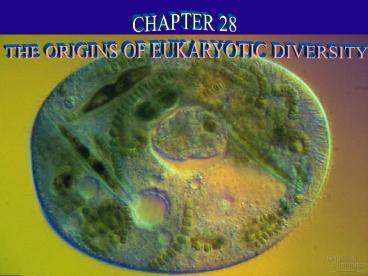THE ORIGINS OF EUKARYOTIC DIVERSITY - PowerPoint PPT Presentation
1 / 79
Title:
THE ORIGINS OF EUKARYOTIC DIVERSITY
Description:
... Chlorophyta Green Algae Spirogyra being eaten by a heterotroph Amoeba proteus-unicellular protozoan- Rhizopoda Rhizopoda amoebas-using pseudopodia Rhizopoda ... – PowerPoint PPT presentation
Number of Views:203
Avg rating:3.0/5.0
Title: THE ORIGINS OF EUKARYOTIC DIVERSITY
1
CHAPTER 28 THE ORIGINS OF EUKARYOTIC DIVERSITY
2
Amoeba proteus unicellular protozoan
3
Diatom unicellular algae
4
A plasmodial slime mold
5
Bull Kelp a multicellular brown algae
6
The Kingdom Protista Problem Several diverse
lineages were combined to form the Protista
making it a paraphyletic taxon
7
(No Transcript)
8
A model for the Origin of Eukaryotes including
the Endosymbiotic hypothesis
9
Secondary Endosymbiosis gives the algae their
diversity
Studies of SSU-rRNA indicate that mitochondria
evolved from ancestors of alpha proteobacteria
and chloroplasts evolved form ancestors of
cyanobacteria
10
Traditional hypothesis for how the
Alternative hypothesis three domains of life are
related based on based on proteins
functioning in DNA
sequences transcription and translation
11
Tentative phylogeny of Eukaryotes
12
A diplomonad-multiple flagella, two nuclei, no
plastids or mitochondria
13
Parabasalids-no mitochondria have an undulating
membrane trichomonads
14
Euglenozoa Euglena
15
Euglenophyta Euglena
16
Kinectoplastids Trypanosoma causes African
Sleeping Sickness
17
Kinectoplastids a large organelle with DNA-
Trichonympha- flagellated protozoan found in the
gut of termites
18
Apicomplexa-Sporozoans
The two host life cycle of Plasmodium that causes
malaria
19
A dinoflagellate-
20
A dinoflagellate-some are bioluminescent
21
A bioluminescent angel Dinoflagellata
22
Ciliophora Ciliates
23
Stentor-uses cilia to pull in food particles
24
(No Transcript)
25
Conjugation in paramecium
26
Conjugation in paramecium
27
Ciliated heterotrophic protozoan-Ciliophora
28
Oomycota water mold-life cycle -have large
immobile eggs and small mobile sperm -have
coenocytic hyphae
29
Release of zoospores by water mold Oomycota
30
Oomycota developing zygotes
31
Oomycota Water molds Powdery Mildew
32
Bacillariophyta-Diatoms-silica-glass-like shell
consist of two halves
33
Diatom-a unicellular alga-Bacillariophyta
34
Bacillariophyta-Diatoms- freshwater species that
has just divided
35
Bacillariophyta-Diatoms
36
Bacillariophyta Diatoms
37
Chrysophyta-Golden Algae
38
Australian bull kelp-multicellular
algae-Phaeophyta
39
Phaeophyta Brown Algae-largest algae
fucoxanthin pigment Air bladders
40
Phaeophyta Brown Algae
41
Phaeophyta Brown Algae
42
Phaeophyta Brown Algae Life Cycle with
alternation of generations
43
Rhodophyta Red Algae-pigment phycobilins that
absorb blue light this allows them to grow at
greatest depths
44
Rhodophyta Red Algae
45
Chlorophyta Green Algae-Volvox-a colonial algae
46
Chlorophyta Green Algae-Volvox-a colonial algae
47
Chlorophyta Spirogyra conjugation
48
Chlorophyta Green Algae-no crosswalls with
multiple nuclei-coenocytic
49
Chlorophyta Green Algae- life of Chlamydomonas a
unicellular algae
50
Chlorophyta Green Algae
51
Chlorophyta Green Algae
52
Chlorophyta Green Algae
53
Chlorophyta Green AlgaeMulticellular
54
Chlorophyta Green Algae
55
Mixed Seaweed
56
Hypothetical history of plastids in eukaryotes
57
Chlorophyta Green Algae Spirogyra being eaten by
a heterotroph
58
Amoeba proteus-unicellular protozoan- Rhizopoda
59
Rhizopoda amoebas-using pseudopodia
60
Rhizopoda amoebas-using pseudopodia
61
Rhizopoda amoebas-using pseudopodia
62
Rhizopoda amoebas-using pseudopodia
63
Rhizopoda-amoebas
64
Actinopoda Heliozoan sun animals freshwater
with stiff axopodia
65
Actinopoda Heliozoan
66
Actinopoda Radiolarian-marine with delicate
silica shells
67
Actinopoda Radiolarian-shell
68
Foraminifera
69
Foraminifera-multichambered shells that contain
calcium carbonate
70
Myxomycota Plasmodial slime mold-coenocytic
71
Life cycle of Myxomycota
72
Myxomycota Plasmodial slime mold-spore germinating
73
Myxomycota Plasmodial slime molds
74
Acrasiomycota cellular slime mold fruiting bodies
75
Acrasiomycota cellular slime mold
76
Acrasiomycota cellular slime mold-spores
77
Acrasiomycota cellular slime mold forming
fruiting bodies
78
Acrasiomycota cellular slime mold forming
fruiting bodies
79
(No Transcript)































